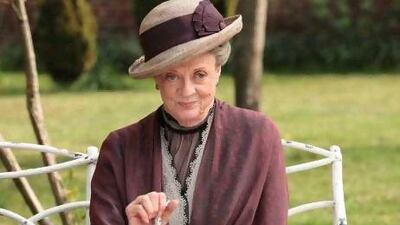It has become one of the most admired, talked-about and celebrated programmes on television. But worldwide acclaim and a Golden Globe are, sometimes, not enough.
Last week, rumours began to surface that two of Downton Abbey's stars are stalling over committing to any further series of Julian Fellowes's lavish period drama. And, reported The Mirror, we're not talking bit-part characters holding out for one last payday. The two are Dame Maggie Smith, brilliant as the acerbic Dowager Countess of Grantham, and Dan Stevens, who plays the dashing Matthew Crawley.
Bowing out after series three, currently in production, would certainly be a surprise – not least because Smith and Stevens are two of the most popular characters. Maggie Smith's Dowager is not actually that important to the drama but the biting sarcasm of her one-liners lend the show its much-needed levity. She is adored by American audiences. Stevens, meanwhile, plays the heir to Downton, the storyline that provided the first series with, well, its plot. No wonder a source on the show is reported to have said: "It's hard to imagine the series without Maggie Smith or Dan Stevens involved in some way."
And perhaps those behind Downton should be worried – even the most successful of shows can stand or fall on the prosaic contract arrangements of their stars. Take Dallas. The death of Bobby Ewing in 1985 caused paroxysms of loss, fans devastated that they would never again swoon over the handsome Patrick Duffy. And ratings fell, to the extent that Larry "JR" Hagman pleaded with Duffy to return. So began one of the most legendary about-turns in television history, where, right at the very end of the 30-episode series that followed, we found that it had all been a dream, and Bobby was alive after all.
It's arguable, too, that The X-Files never really recovered from the semi-departure of David "Mulder" Duchovny midway through the eighth season. It only lasted for one more. And anyone of a certain age will remember the anguish they felt when tuning into The Dukes of Hazzard, only to find Bo and Luke Duke had taken their big chance in Nascar racing and disappeared. In fact, Tom Wopat and John Schneider had been replaced after a contract dispute, but ratings collapsed and the studio was forced to give in to their pay demands and bring them back.
Elsewhere, The West Wing was never quite the same after Rob Lowe left – although the simultaneous departure of the creator and lead writer Aaron Sorkin from the White House drama was probably just as important. And one wonders whether the gaping hole left by Sean Bean's character's death in Game of Thrones – after all, HBO cast him as the leading man – will ever be properly filled when the fantasy series starts up again next month.
But if Downton's producers are genuinely worried, they can always take comfort in the example of Dr Who. The grief that surrounded the brilliant David Tennant's departure as the Time Lord in 2010 was genuine enough to suggest that the show might be in trouble – particularly when the BBC parachuted an unknown into the role. As it turned out, Matt Smith has proved himself to be even better than Tennant, if that's possible.
The American sitcom Cheers also replaced one of its much-loved characters – barmaid Shelley Long – with an actress equally as popular, Kirstie Alley, who made the role her own. And no matter which star was almost wilfully knocked off in Spooks, the British spy show still managed to be appointment-to-view television.
In the end, there's too much goodwill behind Downton Abbey for it to collapse if Smith and Stevens don't get behind a fourth, fifth or even sixth season. But could there be one further reason for their reticence? Might it be possible that they, like many of us, were just a little bit disappointed by a second series full of plot holes and manic shifts in time? Perhaps they're waiting to see whether Fellowes still retains the authorial magic that captivated everyone in season one. In the meantime, it's probably best not to worry. In the words of the Dowager: "Don't be defeatist, dear, it's very middle class."

